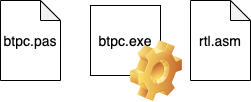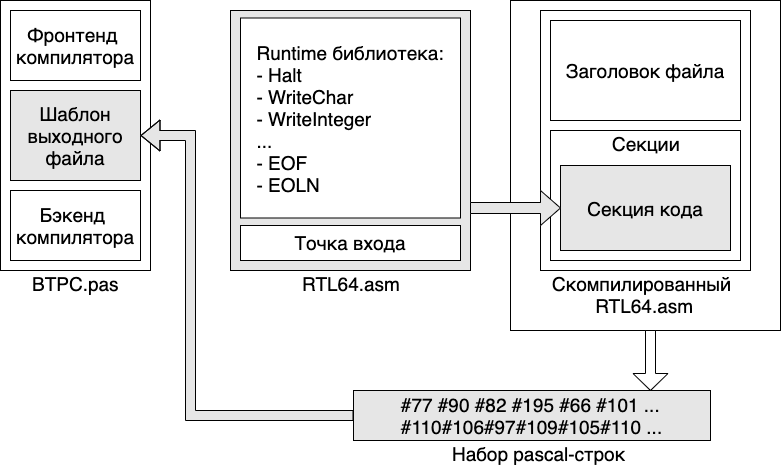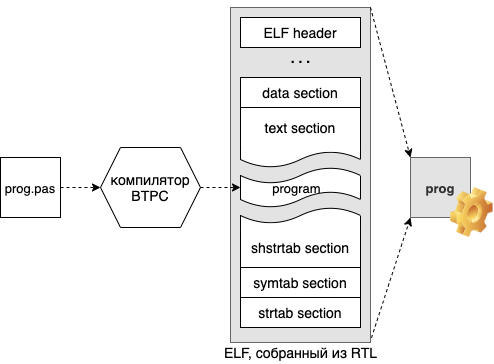Sur Habré, il existe de nombreux articles sur le sujet ELF - que seuls les gens ne font pas avec eux - expliquent leur appareil, les assemblent manuellement et automatiquement, éditent, chiffrent et bien plus encore. Je voudrais à mon tour partager un cas intéressant, à mon avis, qui m'a immédiatement présenté de nombreux aspects de la programmation de bas niveau dans la pratique:
compilation de programmes,
une sorte de rétro-ingénierie et de portage de bibliothèques d'exécution,
fichiers exécutables de l'appareil Windows et Linux,
assembler et éditer ces fichiers manuellement
Ces aspects et d'autres, ainsi que de nombreux mouvements non standard, seront abordés lors du portage du compilateur . Dans le même temps, la partie du travail liée aux fichiers exécutables (et aux ELF en particulier) m'a semblé la plus intéressante, elle deviendra donc le leitmotiv de l'article.
Cet article n'est pas un tutoriel exhaustif, mais il peut intéresser les lecteurs intéressés par un ou plusieurs des domaines ci-dessus et prêts à découvrir (ou à revoir) des approches non standard pour résoudre des problèmes dans ces domaines.
Au cours du travail, nous avons besoin de:
compilateur gcc, éditeur de liens ld, débogueur gdb
utilitaires de binutils (readelf, strip, hexdump)
compréhension de base des périphériques exécutables portables (PE) et ELF
Pascal
, Bero TinyPascal Compiler (, BTPC) 2016 - Pascal, (Benjamin Rosseaux). Pascal' (Delphi 7-XE7 FreePascal >= 3) Windows x32. , .
github . , , :

BTPC ( btpc.exe) self-contained - - ~3 . . - , , , . , , .
Pascal', , - -, , -, . , . " ".
Seg fault
BTPC - PE (Portable Executable, Mircosoft), .. "ELF Windows". , ELF, , - .
, PE 2
Portable Executable (PE) — , , Microsoft Windows. PE , , PE- . , API- ..
PE COFF Unix. «» PE — ELF ( Linux Unix) Mach-O ( Mac OS X).
, , Pascal, , , -:
-
- "-"
- "" PE-
PE- , "" .
- . , (Runtime Library, RTL).
Runtime Library 2
RTL- - CRT C/C++. , , , .. , , .
- pre-start post-exit "", main' . , , main, ( ), main .
PE- RTL 9 :
RTLHalt —
RTLWriteChar — char’ stdout
RTLWriteInteger — integer' stdout
RTLWriteLn — linebreak' stdout
RTLReadChar — EAX STDIN
RTLReadInteger — EAX integer' STDOUT
RTLReadLn — STDIN EOF ( )
RTLEOF — EAX EOF. 0 — .
RTLEOLN — 1 DL, - \n, 0 —
- , :
.ENTRYPOINT
JMP StubEntryPoint #
RTLHalt:
... # RTLHalt
RTLWriteChar:
...
... # RTL
RTLFunctionTable: #
DD OFFSET RTLHalt
DD OFFSET RTLWriteChar
DD OFFSET RTLWriteInteger
...
StubEntryPoint:
INVOKE HeapAlloc ... #
MOV ESI, OFFSET RTLFunctionTable #
ProgramEntryPoint:
, RTL, :
StubEntryPoint
ESI
… , ProgramEntryPoint !
, , BTPC ProgramEntryPoint.
, 2 - .
: btpc.pas rtl.asm . btpc.pas blob, :
{ }
procedure EmitStubCode;
begin
OutputCodeDataSize := 0;
OutputCodeString(#77#90#82#195#66#101#82#111#94#102#114#0#80#69#0#0#76#1#1#0#0#0#0#0#...
OutputCodeString(#0#0#0#0#0#0#0#0#0#0#0#0#0#0#16#0#0#0#16#0#0#143##16#0#0#0#0...
OutputCodeString(#0#0#0#0#0#0#0#0#0#0#255#255#255#255#40#16#0#0#53#0#0#0...
OutputCodeString(#101#110#106#97#109#105#110#32#39#66#101#82#111#...
OutputCodeDataSize := 1423;
end;
{ }
- Pascal- , rtl.asm.
, PE .
, :
RTL ( ) , PE- ( , - )
PE- - ( , 255 )
, - NOP
- ( )

BTPC :
stdin
, -
, -
( - PE-)
, "" , ,
PE32
: - . , , . , , ( ). : , , , .
: 4 , 156 . 100 . , 4 , 100 .
, RTL, Excagena, - PE-. / , Excagena , .
-, PE. , , ProgramEntryPoint - , .
- - PE-. - :
(OptionalHeader.SizeOfCode)
(SectionTable.VirtualSize)
(OptionalHeader.SizeOfImage),
- , , :
{ }
CodeSize := OutputCodeGetInt32($29) + (OutputCodeDataSize - CodeStart);
OutputCodePutInt32($29, CodeSize);
{ }
SectionAlignment := OutputCodeGetInt32($45);
{ }
SectionVirtualSize := CodeSize;
Value := CodeSize mod SectionAlignment;
SectionVirtualSize := SectionVirtualSize + (SectionAlignment - Value);
OutputCodePutInt32($10d, SectionVirtualSize);
{ }
OutputCodePutInt32($5d, SectionVirtualSize + OutputCodeGetInt32($39));
, $29, $45, $115 …
, - Linux x64 . , :
RTL Linux x64
ELF-
ELF-,
- 3

- "" WinApi .
, , . . - , Win32 API, :
ReadCharBuffer: DB 0x90
ReadCharBytesRead: DB 0x90,0x8D,0x40,0x00
ReadCharEx:
PUSHAD
INVOKE ReadFile, DWORD PTR StdHandleInput, OFFSET ReadCharBuffer, 1, OFFSET ReadCharBytesRead, BYTE 0
TEST EAX, EAX
SETZ AL
OR BYTE PTR IsEOF, AL
CMP DWORD PTR [ReadCharBytesRead], 0
SETZ AL
OR BYTE PTR IsEOF, AL
POPAD
RET
, , . , - " " - ReadCharBuffer ReadCharBytesRead. , …

- , , . ( - , - , - ), .
, 64- syscall ( ). , RDI, RSI, RDX . RAX.
x64 pusha, pushad, popa, popad. pushall, popall, . - bss.
, - data.
:
.section .data # -
ReadCharBuffer:
.byte 0x3c
.section .text # -
ReadCharEx:
PUSHALL # - bss
XORQ %RAX, %RAX # syscall #0: read(int fd, void *buf, size_t count)
XORQ %RDI, %RDI # fd : 0 == stdin
MOVQ $ReadCharBuffer, %RSI # buf : ReadCharBuffer
MOVQ $1, %RDX # count : 1 byte
SYSCALL
CMPQ $0, %RAX
SETZ %BL
ORB %BL, (IsEOF)
POPALL
RET
, - . , - , Guard Page.
, , Linux , , , Segmentation fault. , , . , . Guard Page . , , , , .
:
$ gcc -c rtl64.s $ ld rtl64.o -g --output rtl64
ELF - BTPC . .
, BTPC - EmitByte:
procedure OCPopESI;
begin
EmitByte($5e);
LastOutputCodeValue := locPopESI;
end;
procedure OCMovzxEAXAL;
begin
EmitByte($0f);
EmitByte($b6);
EmitByte($c0);
LastOutputCodeValue := locMovzxEAXAL;
end;
, , x64. - ,
1 -
MOV R10, [R12 + R13]
, (, ) "Intel 64 and IA-32 Architectures Developer’s Manual"

. - – R10 "R?".
MOV i8086+. "r/m →R?". , 0x8B.
R10 4 , 3 Rn ModR/M.
"" " REX".
R10 R REX Rn ModR/M.
ModR/M 32- , R/M ModR/M = 100, Mod = 00. SIB.
R12, 1, X REX SIB.
SIB , [#Base + #Index2^(Scale)]. Base R12. 3 = 100 3 Base SIB.
(Index) SIB 3 R13 = 101.
(1 + 1 ), Scale SIB = 00 2^(Scale) = 2^0 = 1.
R13 B REX. SIB.
REX: "0100" + "W:1" + "R:1" + "X:1" + "B:1" = 01001111, hex 0x4F. REX .
ModR/M: "Mod:00" + "Rn:010" + "R/M:100" = 00010100, 0x14.
SIB: "Scale:00" + "Index:101" + "Base:100" = 00101100, 0x2C.
MOV R10, (R12 + R13)
0x4F 0x8B 0x14 0x2C
.
, PE- , , . , BTPC 70 .
: , , .
.
ELF'
, , BTPC - , , "" , , , . .
, , - ELF' - ELF'.
, . 2 :
ELF64 PE32
PE32 ,
readelf' rtl64:
$ readelf --section-headers rtl64 Section Headers: [Nr] Name Type Address Offset Size EntSize Flags Link Info Align [ 0] NULL 0000000000000000 00000000 0000000000000000 0000000000000000 0 0 0 [ 1] .text PROGBITS 00000000004000b0 000000b0 0000000000000317 0000000000000000 AX 0 0 1 [ 2] .data PROGBITS 00000000006003c7 000003c7 00000000000000bf 0000000000000000 WA 0 0 1 [ 3] .symtab SYMTAB 0000000000000000 00000488 0000000000000408 0000000000000018 4 39 8 [ 4] .strtab STRTAB 0000000000000000 00000890 0000000000000248 0000000000000000 0 0 1 [ 5] .shstrtab STRTAB 0000000000000000 00000ad8 0000000000000027 0000000000000000 0 0 1
- ELF' 6 !:
( )
— text
— data
— shstrtab (Section header string table)
symtab
strtab

, . - . ProgramEntryPoint , " ".
? . , 4 , , ELF'.
ld (--nostdlib, --strip-all):
$ ld rtl64.o -g --output rtl64-min -nostdlib --strip-all
ELF 2 - 1.4 . :
$ readelf --section-headers rtl64-min Section Headers: [Nr] Name Type Address Offset Size EntSize Flags Link Info Align [ 0] NULL 0000000000000000 00000000 0000000000000000 0000000000000000 0 0 0 [ 1] .text PROGBITS 00000000004000b0 000000b0 0000000000000317 0000000000000000 AX 0 0 1 [ 2] .data PROGBITS 00000000006003c7 000003c7 00000000000000bf 0000000000000000 WA 0 0 1 [ 3] .shstrtab STRTAB 0000000000000000 00000486 0000000000000017 0000000000000000 0 0 1
2 . , shstrtab . , binutils strip, . shstrtab :
$ strip -R shstrtab rtl64-min $ readelf --section-headers rtl64-min Section Headers: [Nr] Name Type Address Offset Size EntSize Flags Link Info Align [ 0] NULL 0000000000000000 00000000 0000000000000000 0000000000000000 0 0 0 [ 1] .text PROGBITS 00000000004000b0 000000b0 0000000000000317 0000000000000000 AX 0 0 1 [ 2] .data PROGBITS 00000000006003c7 000003c7 00000000000000bf 0000000000000000 WA 0 0 1 [ 3] .shstrtab STRTAB 0000000000000000 00000486 0000000000000017 0000000000000000 0 0 1
Shstrtab . , :
$ hexdump -C rtl64-min 00000480 40 00 00 00 00 00 00 2e 73 68 73 74 72 74 61 62 |@.......shstrtab| 00000490 00 2e 74 65 78 74 00 2e 64 61 74 61 00 00 00 00 |..text..data....| 000004a0 00 00 00 00 00 00 00 00 00 00 00 00 00 00 00 00 |................|
… ! . , .shstrtab . , , - , .
, ( ). . , .
, :
ENTRY(_start) /* */
SECTIONS
{
. = 0x4000b0; /* */
.data : { *(.data) }
.bss : { *(.bss) *(COMMON) }
. = 0x6000d3; /* */
.text : { *(.text) } /* */
}
ld - . , , ld --verbose
- , , . .
. :
$ ld rtl64.o -g --output rtl64-custom-ld -T linkerScript.ld -nostdlib --strip-all $ readelf --section-headers rtl64-custom-ld Section Headers: [Nr] Name Type Address Offset Size EntSize Flags Link Info Align [ 0] NULL 0000000000000000 00000000 0000000000000000 0000000000000000 0 0 0 [ 1] .data PROGBITS 00000000006000b0 000000b0 00000000000000bf 0000000000000000 WA 0 0 1 [ 2] .text PROGBITS 0000000000a00170 00000170 0000000000000317 0000000000000000 AX 0 0 1 [ 3] .shstrtab STRTAB 0000000000000000 00000487 0000000000000017 0000000000000000 0 0 1
, ! text, , data.
, , . gdb, - , , , , .
, - gdb . , …
, , , symtab strtab , . , - - ( , .. )
, . , , . stackoverflow , , . :

, , :
|
|
Elf__hdr.e__shoff |
0x28 |
Text_phdr.p_filesz |
sizeof(Elf__hdr) + sizeof(p_hdr) + 0x20 |
Text_phdr.p_memsz |
sizeof(Elf_hdr) + sizeof(p_hdr) + 0x28 |
Text_shdr.sh_size |
Elf_hdr.e_shoff + sizeof(injection) + 2*sizeof(s_hdr) + 0x20 |
Shstrtab_shdr.sh_offs |
Elf_hdr.e_shoff + sizeof(injection) + 3*sizeof(s_hdr) + 0x18 |
Symtab_shdr.sh_offs |
Elf_hdr.e_shoff + sizeof(injection) + 4*sizeof(s_hdr) + 0x18 |
Strtab_shdr.sh_offs |
Elf_hdr.e_shoff + sizeof(injection) + 5*sizeof(s_hdr) + 0x18 |
: sizeof(injection). .
, , ELF', - , , , .
, , "", "" "", .
. , ELF, , . - . , RTL.
.
- bootstrapping
#
$ btpc.exe < btpc64.pas > btpcCrossWin.exe
# Linux–
$ btpcCrossWin.exe < btpc64.pas > btpc64Linux
# , «» , Linux
$ btpc64Linux < btpc64.pas > btpc64Check
Pascal, Linux x64, .
, , . :
BTPC
, Pascal Windows
(RTL)
RTL ELF
, , , . , - . , ,
P.S.
, , . , , 9 . , . . , , , . , ( " ?") . , , , "", , ("" ).
De plus, je ne peux que remercier mon conseiller scientifique, Alexander Konovalov.
Comme indiqué au début, cet article n'était pas destiné à expliquer le périphérique ELF, à apprendre à effectuer des tours de folie sur eux ou à porter des programmes. Mais en utilisant un exemple réel, elle a, je l'espère, montré comment des solutions non standard à des problèmes ordinaires peuvent être, quelles choses intéressantes peuvent être observées au cours de leur résolution et quelles découvertes faire pour soi-même ... Et peut-être qu'elle encouragera quelqu'un à faire le premier pas vers la suivante un défi inexploré mais passionnant ...